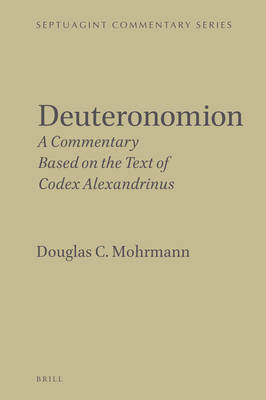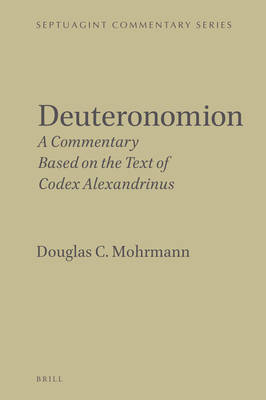
- Afhalen na 1 uur in een winkel met voorraad
- Gratis thuislevering in België vanaf € 30
- Ruim aanbod met 7 miljoen producten
- Afhalen na 1 uur in een winkel met voorraad
- Gratis thuislevering in België vanaf € 30
- Ruim aanbod met 7 miljoen producten
Zoeken
€ 383,45
+ 766 punten
Omschrijving
This commentary on Deuteronomion is based on Codex Alexandrinus, the single best complete witness to the Old Greek. It features a new transcription of the manuscript with a fresh translation that treats Deuteronomion as a sacred text that would have been read, studied, and cherished in a worshipping community. Notations of important variants with the other key manuscripts, such as p848, p963, and B (Vaticanus), appear regularly. This commentary represents an interpretative adventure, intentionally giving room for varied ancient reader-responses, and accordingly it functions within several literary spaces. First, it recognizes the substantial intratextual features between the book's narrative framing and its legal materials. Deuteronomion is also read in its hypotextual relation with the Pentateuch's other narratives and legal materials, chiefly within Exodus, Leviticus, and Numbers. Sensitivity to the Greek linguistic climate, the so-called koine Greek, is another space. Finally, and most distinctively, this commentary adds to its reading the many voices who read and used Deuteronomy, in either Hebrew or Greek forms, from the late Second Temple Period.
Specificaties
Betrokkenen
- Auteur(s):
- Uitgeverij:
Inhoud
- Aantal bladzijden:
- 556
- Taal:
- Engels
- Reeks:
Eigenschappen
- Productcode (EAN):
- 9789004536531
- Verschijningsdatum:
- 24/02/2023
- Uitvoering:
- Hardcover
- Formaat:
- Genaaid
- Afmetingen:
- 155 mm x 235 mm

Alleen bij Standaard Boekhandel
+ 766 punten op je klantenkaart van Standaard Boekhandel
Beoordelingen
We publiceren alleen reviews die voldoen aan de voorwaarden voor reviews. Bekijk onze voorwaarden voor reviews.











